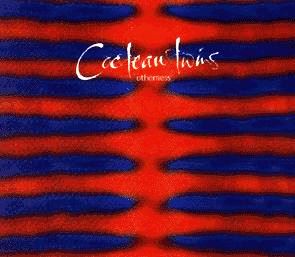
Seekers Who Are Lovers
Violaine
Cherry-Coloured Funk
Otherness - 1995

|
Feet-Like Fins
Seekers Who Are Lovers Violaine Cherry-Coloured Funk |
|
With Four-Calendar Café almost a distant memory and the release of Milk & Kisses still a few months away the band suddenly came up with two very unusual EP's. Both Twinlights and Otherness, released just a month apart, are very different from the band's other work, and both came with some strikingly beautiful artwork on the sleeve as well. Both EP's contain four tracks, some of which were remakes of older work, some of which were to appear in 'normal' versions on Milk & Kisses. That's where the similarities end though, since the two EP's could hardly be more different in style and atmosphere. The tracks on Otherness apparently contain just vocals and electronics, with influences from house, techno, ambient, disco and probably a handful of other styles as well. The music is so different that in some cases it's very hard to recognize the original track at all. The first two tracks in particular effectively contain repetitions of a single fragment of the original song only. The other two more or less could be called remakes, but still have virtually every key element changed in one way or the other. Otherness indeed - never was a title more aptly selected. The CD is obviously out of print but all four tracks were included on the Lullabies To Violaine compilation. |
|
Feet-Like Fins Most people would have a hard time when asked to find any concrete similarity between this track and the original version. The vocals are totally different, there are no acoustic guitars, no cymbals either. Instead we have a beat, a constant electronic background, fragmentary vocals and of course numerous overdubs. It's not even all that obvious that this track evolved from its Victorialand counterpart. In some inexplicable way though this track still somehow manages to sound similar to the first half of the original. And indeed some notes and what scarce melody can be detected vaguely resemble bits of that earlier version. The result is quite enjoyable, very different from yet oddly reminiscent of the original, and despite all those unusual elements still very much a Cocteau track. |
|
Seekers Who Are Lovers This is the song on Otherness that least resembles the original version. Just a few chords are recognizable, but none of the lyrics or the normal rhythms feature in this most unusual track. A sharp kind of percussion is the most conspicuous element of the song. Liz' contributes dramatic vocals in three different lines simultaneously, and all that against the background of some ambient keyboard chords. The song hardly has an end or a beginning, and almost arbitrarily stops at some point. Despite all that the band somehow still manage to sound like the Cocteau Twins. It's probably Liz' unmistakable voice that does the trick, but in any case it is a small miracle that it is possible to forsake virtually every musical style you are known for and still come up with a song that is a recognizable Cocteau product. |
|
Violaine Of all the four tracks on Otherness this one comes closest to the studio version. Especially the vocal fragments are not too different, but the crafty guitar effects have been replaced by drum beats and electronic effects. Since those guitars are at the heart of the original it's hardly surprising that this version is only a pale shadow compared to the original masterpiece. |
|
Cherry-Coloured Funk Take a single vocal line from an earlier song, repeat it a hundred times and add some techno style keyboards as background. That doesn't exactly sound like a recipe for success, but in this song the band show that such an approach is not necessarily bound to fail. The song is Cherry-Coloured Funk from their Heaven Or Las Vegas album, the vocal line is from the chorus in the latter part of the song and (probably) goes Still being cried and laughed at from behind me But matters are of course more complicated than that. Naturally there are countless vocal overdubs. Liz is singing duets with herself, inserts other fragments of the original song and generally succeeds in sounding like a group of vocalists rather than a single one. The background weaves subtle variations around Liz' tapestry of voices. Still, the song features just a single theme, repeated throughout for nearly six minutes. Taking that into account it is amazing to find the track is over really all too quickly. |